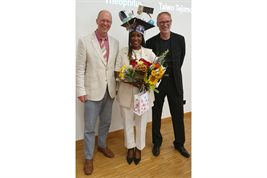19.07.2024

On 15.07.2024, Esther Shupel Ibrahim successfully defended her doctoral thesis on "Modelling and Predicting Diseases and Pests Impacts on Crop Production under Climate Change in Nigeria: Combining Remote Sensing and Agro-Ecosystem Modelling" at the Humboldt University of Berlin, in which she developed basic steps for establishing an early warning system for important pests and diseases of potato and maize cultivation in Nigeria. The core elements of her work are the mapping of potato-maize mixed crop systems with the help of remote sensing, the identification of risk areas for the occurrence of plant diseases and the model-based estimation of the proportion of pest infestation in climate change-related yield losses in Nigeria.
Shupel Ibrahim is a researcher in the Landscape Modelling group of Prof. Claas Nendel at ZALF, and at the same time at the Geomatics Lab of the Humboldt University of Berlin under the supervision of Prof. Patrick Hostert. Dr Ibrahim has also maintained her position as Chief Scientific Officer at the National Centre For Remote Sensing in Jos, Nigeria, and has used her networks in agriculture there for her research work. She also serves as President of the Nigerian branch of Women in Aerospace.
Shupel Ibrahim's dissertation includes the first large-scale mapping of mixed cropping systems in a part of the African continent where smallholder farming with its small-scale structures makes it difficult to record crop shares and associated yields per unit area. It is also this type of agriculture that is particularly susceptible to yield losses due to pests and diseases, a risk factor that in some places is considered to be more serious than the direct influence of climate change. In her work, Dr Ibrahim investigated the geo-ecological risk factors of the disease outbreaks, contextualising the observations of the local families farming the land. Using remote sensing and a remarkable dataset of local observations, she was also able to utilise both data-driven and process-based models to demonstrate their potential for an operational early warning system for pest and disease control. The chemical agents currently used by the rural population in a very unspecific and almost constant manner could be drastically reduced with the digital support of an early warning system, without having to accept further yield losses.
We would like to congratulate Dr Shupel Ibrahim on her doctorate, which was graded "very good", and we look forward to continuing to work with her on externally funded projects.
